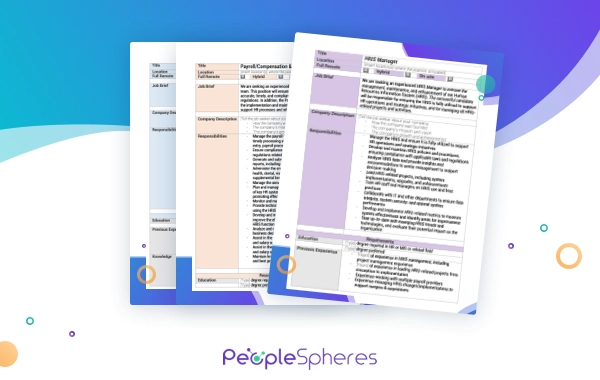
Are you looking to add an HRIS professional to your team ? We’ve done the work for you and identified the skills and experience necessary for success for 8 different HRIS roles to help you attract top talent.
Download our ready-to-use and 100% customizable job description templates which include:
 Job Brief
Job Brief
 Job Responsibilities
Job Responsibilities
 Required/Preferred Education & Experience
Required/Preferred Education & Experience
 Soft Skills
Soft Skills
 Technology Skills
Technology Skills
 And more…
And more…

8 HRIS Job Roles
Download this document to find a full job description for the following eight HRIS roles:
HRIS Manager
The HRIS Manager oversees the daily operations of the company’s Human Resources Information Systems. This role involves ensuring the HRIS platforms are functioning smoothly, implementing new systems, and managing system updates. They act as the bridge between HR and IT, ensuring the HRIS supports the organization’s HR policies and processes.
Payroll/Compensation & HRIS Manager
This role combines expertise in payroll and compensation with HRIS management. The Payroll/Compensation & HRIS Manager not only oversees the HRIS functionalities but also ensures that the system accurately manages pay and compensation packages. This includes everything from regular paychecks to bonuses and other forms of compensation, making sure that they are processed correctly through the HRIS.
Global HRIS Manager
Similar to an HRIS Manager, but on a global scale, the Global HRIS Manager handles the HRIS needs of an international organization. They must consider the complexities of different countries’ labor laws, currency conversions, and regional HR practices.
This role requires a good understanding of global HR policies and how to implement and manage systems that cater to diverse global requirements.
HRIS Analyst
An HRIS Analyst focuses on the technical aspects of HRIS applications. They analyze and report on the data within these systems, help with system improvements, troubleshoot issues, and ensure the HRIS meets the company’s needs. This role often involves a lot of data analysis to help improve HR operations through technology.
HR Data Analyst
The HR Data Analyst specializes in handling and analyzing large sets of data related to human resources but doesn’t necessarily focus exclusively on HRIS systems.
They look at various HR metrics, like employee performance data, hiring trends, and turnover rates, to provide insights that help in strategic decision-making. This role is crucial for organizations looking to leverage data for HR strategy and planning.
HR Technology Consultant
An HR Technology Consultant advises organizations on their HR technology systems. This can include selecting new HRIS software, optimizing existing systems, or integrating new technology solutions into their current setup.
They help tailor technology solutions to fit the specific needs of the HR department, enhancing overall efficiency and effectiveness.
HRIS Integration Specialist
The HRIS Integration Specialist focuses on integrating the HRIS with other systems within the organization, such as finance or sales software. This role is vital for ensuring that data flows seamlessly between different departments and that the systems communicate effectively, which is key to maintaining accurate and consistent data across the organization.
HRIS Training Specialist
This specialist is responsible for training the HR staff and, occasionally, other users on how to use the HRIS effectively. The HRIS Training Specialist develops training materials, conducts training sessions, and helps users understand new features and updates. Their goal is to ensure that all users are comfortable and proficient with the HRIS, maximizing the system’s benefits for the organization.